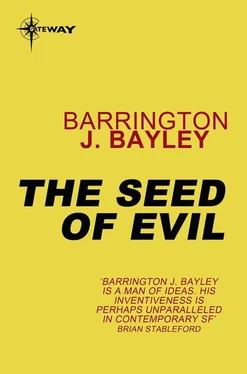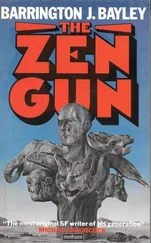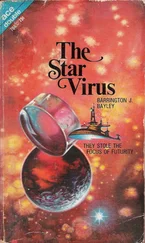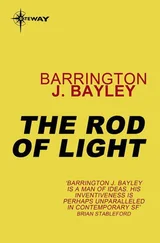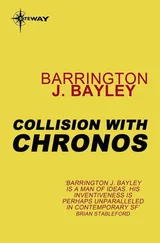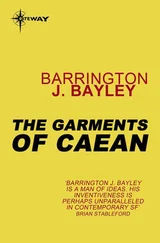Barrington Bayley - The Seed of Evil
Здесь есть возможность читать онлайн «Barrington Bayley - The Seed of Evil» весь текст электронной книги совершенно бесплатно (целиком полную версию без сокращений). В некоторых случаях можно слушать аудио, скачать через торрент в формате fb2 и присутствует краткое содержание. Город: London, Год выпуска: 2012, ISBN: 2012, Издательство: Gateway, Жанр: Фантастика и фэнтези, на английском языке. Описание произведения, (предисловие) а так же отзывы посетителей доступны на портале библиотеки ЛибКат.
- Название:The Seed of Evil
- Автор:
- Издательство:Gateway
- Жанр:
- Год:2012
- Город:London
- ISBN:978-0-575-10220-0
- Рейтинг книги:4 / 5. Голосов: 1
-
Избранное:Добавить в избранное
- Отзывы:
-
Ваша оценка:
- 80
- 1
- 2
- 3
- 4
- 5
The Seed of Evil: краткое содержание, описание и аннотация
Предлагаем к чтению аннотацию, описание, краткое содержание или предисловие (зависит от того, что написал сам автор книги «The Seed of Evil»). Если вы не нашли необходимую информацию о книге — напишите в комментариях, мы постараемся отыскать её.
, here is a second collection of endlessly inventive stories by Barrington J. Bayley; dark fables resounding with sombre undertones—love used as a weapon, God assassinated by the ingenuity of man, the secret of death revealed, the inexplicable explained! Tales which will be pondered on, and remembered.
The Seed of Evil — читать онлайн бесплатно полную книгу (весь текст) целиком
Ниже представлен текст книги, разбитый по страницам. Система сохранения места последней прочитанной страницы, позволяет с удобством читать онлайн бесплатно книгу «The Seed of Evil», без необходимости каждый раз заново искать на чём Вы остановились. Поставьте закладку, и сможете в любой момент перейти на страницу, на которой закончили чтение.
Интервал:
Закладка:
She gave a low, regretful laugh. “Don’t worry, I wouldn’t want to be in on any more mad schemes. The others feel the same way too. But unlike them I don’t feel bitter about what you got me into. What’s the use?” She tilted her glass. “As a matter of fact I was looking forward to seeing you. I thought we might—”
She glanced at him familiarly with the same bright, hazel eyes he had known before. Hastily Julian looked away. He pushed himself from the table and stood up.
“Sorry, Ursula, time’s too short. Finish the wine yourself.”
Without looking back he strode out.
One phrase that Julian had used to Neverdie was the kingpin of his strategy.
Societies change. He had already messed up one opportunity. To gain another he had only to forward himself some centuries into the future.
The technique of putting the human body into suspended animation, permanently if need be, was already perfected. It was practised on thousands of people with incurable diseases who hoped they could be cured when they awoke. Once initiated, the process required no expenditure of power and assured Julian of personal, self-dependent survival.
He sank most of his assets, which were large, into the time-travelling chamber. He was prepared, if necessary, to pursue Neverdie down the millennia.
There was one risk, of course. The government, with what struck Julian as insane complacency, instead of impounding the alien’s tiny interstellar ship and extracting from it the technology to take mankind to the galaxy, had merely allowed him to store it in a garage beneath his house. It was conceivable that Neverdie would leave Earth before Julian awoke. But he did not think so: the Aldebaranian seemed quite settled, and if what he wrote in his books was true there were not too many places he could go.
With this point in mind, however, Julian pursued his plans in utmost secrecy. His time-vault had two compartments: the suspension chamber which could also serve as living accommodation, and a larger chamber which was virtually a duplicate, except that it was even more elaborate, of what had been aboard the Rudi Dutschke . The vault was of the most durable construction. It could not rust, corrode or weather. It was built of the new type of carbon-bonded material that had properties close to that of diamond but which was too expensive as well as too long-lasting for use in normal construction.
The basic timing mechanisms were of the same material. Julian had an arrangement which was as close to immortality as Earthly technology could make it. The vault and most of its contents—including many of his surgeon’s instruments—would persist and be functional even when London itself had crumbled and vanished. Not that he anticipated such a long tour of duty. He set the timing mechanism in the first instance at five hundred years hence, knowing that in that period even the noblest societies could turn into the most debased.
The centuries passed. The society of West-Europe underwent a number of vagaries, most of which Neverdie predicted and accommodated himself to fairly well. He became an obscure but permanent, little-noticed resident of London. It was an extraordinary fact about the human species (Neverdie had observed it was a fact about most species), that in spite of its avowed interest in the universe at large in the long run it was interested only in its internal affairs. Neverdie was expert at staying out of the way of those affairs.
But in one important respect Julian had underestimated him, just as he had underestimated Courdon. Neverdie was watchful. He took care to get news of Julian. When that news suddenly stopped he engaged agents to get news of him from wherever in the world he might have moved to. But no news came; Julian Ferrg had disappeared.
Neverdie was a careful being who moved slowly. His great advantage over all his enemies was that he had more time than they did. And in his chequered career he had met the suspended animation ploy before. This, in his opinion, was what Julian had done.
Locating the surgeon’s time-vault was not a matter of urgency. Neverdie did it without making any overt enquiries. He merely collected a large number of insignificant facts over a long period of time and watched the rebuilding pattern of London over the decades. His intuition that the vault was in London was fairly quickly confirmed; and some detective work concerning the legal arrangements of several possible sites told him, roughly one hundred years after Julian’s internment, exactly where the surgeon was.
One night a twenty-third-century-style airplat drifted into the ancient, semi-underground part of the city. The lighting system was poor in this quarter and it glinted palely over the outlines of the vehicle. At length the airplat ventured up a dusty alley and came to rest before a decaying building beneath a warehouse.
Neverdie crept from the airplat. In his manipulatory limbs he carried a number of tools of a type which Earth did not have. Plastic and masonry gave way to make a small hole, like an enlarged rat-hole, through which he could crawl.
The interior was pitch-black and oddly cold. With a click Neverdie brought to the scene a dim light by which a human being would scarcely have been able to see at all. In the depths of the run-down building he eventually discovered the smooth, cold exterior of the vault.
Neverdie switched on the other cutting tool he carried. Its slim beam did not even carry enough energy to light a match, yet it neatly disassociated the bondings of the material and carved out a neat section. Inside, Neverdie found Julian pale and dead inside a cylinder of the inert gas argon.
The Aldebaranian was not a murderer. His actions were preventive, not assaultive. He found the timing mechanism and after a minute’s study disconnected it, leaving the reviving device inactive. Julian’s suspension would never end now without outside aid. Satisfied with his work, Neverdie repaired the incision in the wall of the vault, cleared up the other evidence of his intrusion and left.
SIX
London crumbled and rose again. Millennia passed and even geography changed, but always a city stood where London had been, except for one period when it was replaced by a lake. And in all this time Neverdie continued to dwell on the fringe of human society, building for himself the image of the perpetual hermit, the Wise Being on the Hill, the Oracle, anything that would protect him from superstitious vindictiveness.
There were many occasions when Julian’s time-vault came under scrutiny during the periodic rebuildings of the city. Each time when it seemed likely that the vault would be opened (and the waxing and waning technology did not always make this possible) Neverdie would intercede and persuade the authorities to leave it untouched. Under his auspices it was eventually removed to a site on a hill overlooking the city to the north.
But at last the age of Homo sapiens itself passed.
For a long time Neverdie had seen the end coming, but he had offered no hint of it to his long-standing hosts. Human scientists had never quite understood the laws of evolution. They had not realised that just as an individual animal had a natural life-span, so an entire species had a natural life-span which was predetermined by its hereditary genes. Nature, having made one dominant species, liked to wash it down the drain and try something different with another. For this reason evolutionary changes sometimes proceeded with suddenness. Homo sapiens had emerged from primate stock over a span of tens of thousands, rather than of millions, of years, and the death of the species was coming just as suddenly as had the birth. With the running down of the genetic clock births became fewer, society collapsed and the vitality of the human race entirely vanished.
Читать дальшеИнтервал:
Закладка:
Похожие книги на «The Seed of Evil»
Представляем Вашему вниманию похожие книги на «The Seed of Evil» списком для выбора. Мы отобрали схожую по названию и смыслу литературу в надежде предоставить читателям больше вариантов отыскать новые, интересные, ещё непрочитанные произведения.
Обсуждение, отзывы о книге «The Seed of Evil» и просто собственные мнения читателей. Оставьте ваши комментарии, напишите, что Вы думаете о произведении, его смысле или главных героях. Укажите что конкретно понравилось, а что нет, и почему Вы так считаете.
